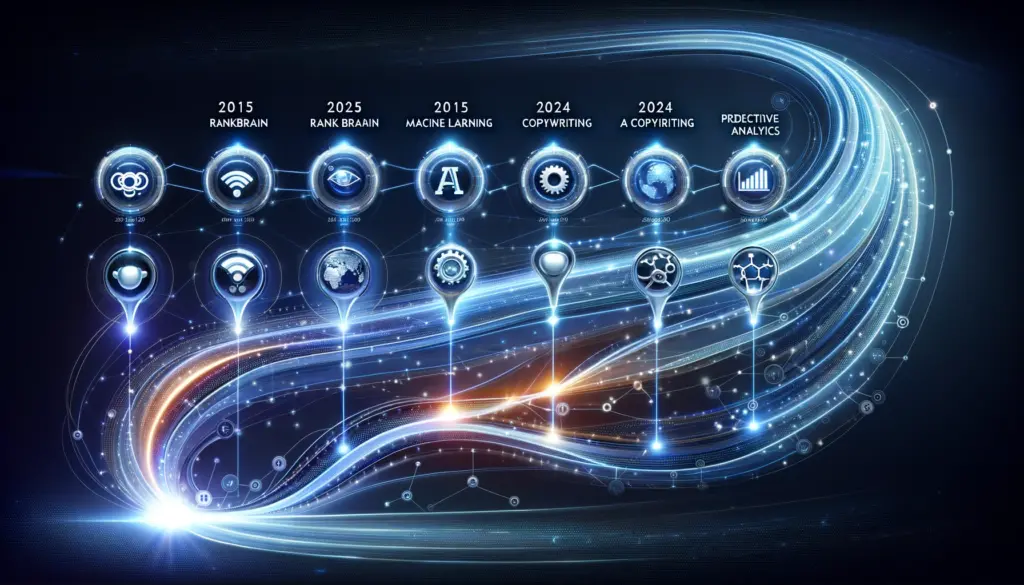Artificial intelligence (AI) is revolutionizing search engine optimization (SEO) strategies. With advanced machine learning algorithms, AI tools can analyze vast amounts of data, identify patterns and insights, and provide actionable recommendations to improve website visibility and traffic.
AI is enhancing multiple aspects of SEO, from conducting in-depth keyword research and creating optimized content to analyzing technical website issues. As a result, AI is transforming SEO into a more efficient, scalable, and data-driven process.
Brands that leverage AI for SEO can gain a significant competitive advantage. They can unlock hidden SEO opportunities, create content faster, and implement highly tailored SEO campaigns.
Overall, AI is poised to change the SEO landscape drastically. Businesses that fail to adapt their SEO strategies risk falling behind the competition.
- Understanding AI in SEO
- The Benefits of AI for SEO
- Overview of Top AI SEO Tools
- Practical Applications of AI in SEO
- Ethical and Professional Considerations in AI SEO
- Voice and Visual Search Optimization with AI
- AI-Driven User Personalization and Experience
- Integrating AI with Other SEO Tools
- Overcoming Challenges in AI SEO Implementation
- Dos and Don’ts of Using AI for SEO
- Real-World Examples and Case Studies
- Advanced Predictive Analytics and AI for SEO Monitoring
- The Future of AI and SEO
- Conclusion
- Frequently Asked Questions
Understanding AI in SEO
AI in SEO refers to leveraging artificial intelligence technologies to optimize websites and content for search engines like Google, enhancing their visibility in search engine results pages.
Key capabilities of AI in SEO include:
- Automated data analysis: AI can process vast datasets beyond human capabilities to uncover insights.
- Predictive analytics: Identify trends and shifts in user intent through machine learning models to align content strategies with Google search trends.
- Personalized content: Tailor content for individual users based on their interests and behavior.
- SEO task automation: Streamline tedious SEO tasks like keyword research, link building, etc.
- Content creation: Automatically generate new pieces of SEO content or optimize existing ones.
By leveraging these AI capabilities, SEO professionals can work smarter and faster while creating better-optimized digital experiences.
The Evolution of AI in SEO
AI has been an integral part of search engine algorithms for years. In 2015, Google first introduced RankBrain, its machine learning algorithm designed to better understand the intent behind search queries.
Since then, AI’s role in SEO has expanded dramatically:
- 2016-2017 – Google rolls out improvements to RankBrain, enhancing search intent understanding. SEO tools like Moz and Ahrefs integrate basic AI for backlink analysis.
- 2018-2019 – Major platforms like SEMrush and Surfer SEO release proprietary machine learning algorithms to uncover SEO insights.
- 2020 – COVID pandemic accelerates AI adoption. Tools like Frase and MarketMuse help with content creation by generating content ideas aligned with search intent.
- 2021 – SEO.ai launches as one of the first fully AI-powered SEO suite of tools.
- 2022 – Large language models like GPT-3 give rise to AI copywriting tools for SEO.
- 2023 – ChatGPT demonstrates the expansive potential of generative AI for SEO.
In 2024 and beyond, AI will become integral to all aspects of SEO – from conducting technical audits to optimizing content. Brands must embrace this intelligence to stay ahead.

The Benefits of AI for SEO
Streamlining SEO Processes
One of the biggest benefits of AI for SEO is enhanced process efficiency. SEO projects involve many repetitive and time-consuming tasks that AI can automate.
Keyword research is foundational for any SEO campaign. An AI tool like Semrush can quickly analyze millions of keywords, grouping them into thematic clusters and identifying low competition opportunities.
For content creation, AI copywriting tools like Jasper or INK can generate entire outlines or blog posts on a given topic optimized for SEO. This creates a strong starting point for human writers, while maintaining their creativity they can also humanize AI text if needed using an AI Humanizer.
Analyzing backlinks and identifying new outreach opportunities is extremely tedious without the help of AI-powered tools. Backlink analysis can be automated with AI to find relevant websites and even generate personalized outreach emails.
Overall, AI drastically cuts down the time spent on mundane SEO tasks, allowing you to focus on strategy and creativity.
Enhancing User Experience
Beyond directly improving SEO rankings, AI can also optimize user experience on your website.
By analyzing visitor behavior patterns, AI digital marketing tools can provide data-driven recommendations on improving site architecture and navigation for better usability.
For ecommerce stores, AI can deliver personalized product recommendations and tailored content for each user segment to drive more conversions.
Voice search optimization is another key application, as AI assistants continue to gain popularity. Analyzing search queries and mapping them to relevant pages on a website is an excellent use of AI.
Enhancing user experience indirectly yet significantly helps SEO by improving engagement metrics like lower bounce rates.

Overview of Top AI SEO Tools
Artificial intelligence (AI) tools are revolutionizing search engine optimization (SEO) by automating tedious tasks and providing data-driven insights. Here is an introduction to some key AI SEO tools:
- Semrush – A leading SEO suite with AI capabilities like automated keyword research, backlink analysis, content gap identification, and predictive SEO analytics. Semrush leverages AI for granular and predictive keyword research. You can analyze search volume patterns years into the future to identify the best terms to target proactively. Its topic Research tool, powered by AI, gives strategic guidance on content gaps compared to competitors.
- SEO Writing – An AI writing assistant that creates SEO-optimized content like blog posts, reviews, etc.. It has pre-built templates and workflows for different content types, optimizing for search engine results through AI-powered tools.
- Neuron Writer makes content creation simple through its user-friendly interface and AI assistant. It allows you to choose from many templates across different formats like blog posts, long form articles, FAQs, etc. Neuron Writer’s AI will then generate an outline or draft piece of content optimized for SEO. The key advantage is the ability to produce high-quality content tailored to your brand voice rapidly.
When comparing AI SEO tools, look at factors like the specific use case focus, depth of capabilities, ease of use, customer support availability, and pricing model to determine the best fit. Many vendors offer free trials to test out products.
Practical Applications of AI in SEO
Let’s explore some practical ways SEO teams can apply AI tools for better results:
Content Creation and Optimization
AI writing assistants like SEOWriting (that we highly recommend), Neuron Writer, or Jasper allow you to produce content outlines and drafts within minutes by simply entering a topic, keyword, or content type. This creates a framework for human writers to build upon, significantly boosting efficiency.
Existing content can be optimized for higher search visibility by using AI tools like Frase and Surfer. Their algorithms analyze your content, suggest additional keywords and links to add, and provide an SEO score benchmarked against top-ranking pages.
Keyword Research and SERP Analysis
Conducting manual keyword research is extremely labor-intensive. AI software like Semrush and Ubersuggest leverage machine learning to cluster related keywords, analyze search volume patterns, and benchmark difficulty scores to identify the best terms to target.
By aggregating signals from Google’s algorithm, AI can also determine the optimal content length, media formats, backlinks required, and other factors needed to rank for a particular keyword. Tools like Surfer and RankIQ provide such SERP analysis.
Technical SEO Enhancements
Optimizing site speed and technical SEO requires examining hundreds of data points. Botify utilizes machine learning algorithms to crawl websites and detect issues negatively impacting site performance and organic rankings.
ScreamingFrog is another AI-powered technical audit tool that provides detailed technical recommendations on improvements like fixing broken links, adding alt text for images, and optimizing page speed.
Ethical and Professional Considerations in AI SEO
As the use of AI proliferates in SEO, brands must establish ethical guardrails regarding transparency and quality.
Many expert agencies believe AI-generated content should be clearly labeled as such. Trying to pass it off as human-written risks damaging user trust if exposed.
Brands should audit AI output for quality and accuracy before public release. For example, AI-generated blog posts may fail to cite sources appropriately or contain factual inaccuracies without oversight.
Maintaining high professional standards around AI usage builds credibility with users, regulators, and industry peers. The wise approach is embracing AI’s potential while addressing its limitations upfront through human supervision.

Voice and Visual Search Optimization with AI
Voice search represents an enormous shift in consumer behavior as AI assistants like Siri, Alexa and Google Assistant explode in popularity. Brands must optimize for voice search to stay discoverable.
Many Tools analyze website content and automatically create voice-friendly versions. AI identifies terms users likely speak but don’t type. This data then connects pages to probable voice queries, improving Google search visibility.
Visual search is another emerging frontier, as image recognition technology enables querying by photo instead of text. Google Lens demonstrates this well. Similar to voice, AI can optimize and connect images on your site to drive visibility for visual searches.
AI-Driven User Personalization and Experience
Website personalization is vital for engagement and conversions. AI powers this by serving tailored content and recommendations based on each user’s interests and behavior.
Many advanced tools build machine learning models on website traffic to identify visitor segments. It then delivers personalized homepage content, product recommendations, pop-up messages and more to match each segment.
Such AI-driven personalization significantly lifts metrics like click-through rates and time on site. It also provides a competitive edge where every user feels valued individually.
Integrating AI with Other SEO Tools
Rather than taking an all-or-nothing view, brands should integrate AI selectively into their existing SEO technology stack to enhance their presence on the search engine results page.
AI can feed insights into broader platforms like analytics and rank tracking tools. For example, AI might identify new keyword opportunities which teams then prioritize in their SEO roadmaps on Ahrefs.
Bid management platforms like Optmyzr can incorporate signals from AI tools into models driving ad bids and budget allocation for optimal ROI.
Instead of entirely replacing legacy tools, AI should power up their capabilities. Thoughtfully blending AI into the martech stack boosts flexibility. Teams choose the best tool per use case while benefiting from AI.
Overcoming Challenges in AI SEO Implementation
Deploying emerging technologies like AI inevitably involves early stage challenges. How brands address these determines long-term success.
Many tools today provide narrow AI capabilities, excelling in specific applications like writing assistant or site audits. Linking insights across tools requires manual effort, creating friction in AI adoption.
Integrating AI also means rethinking existing SEO processes and team roles. Change management requires reassuring stakeholders like writers, link builders and analysts on how AI augments their work rather than replaces them.
That is why taking an iterative, phased approach to AI deployment is wise. Starting with a limited pilot, proving value and then expanding mitigates disruption. It also provides flexibility to switch strategies based on outcomes.
Dos and Don’ts of Using AI for SEO
Best Practices and Guidelines
When leveraging AI for SEO, focus on its strengths like data analysis while keeping human oversight for strategy, creativity and judgment. Utilize AI to uncover insights from vast data, not as a shortcut.
Create guardrails around AI by establishing protocols for fact checking, citing sources, and reviewing output to ensure quality and accuracy. Build trust by being transparent about AI usage.
Common Pitfalls and Misconceptions
A common misconception is that hands-off automation with AI will solve all SEO challenges. But poor quality or unvetted content from AI can damage search visibility and user trust over time.
Over-reliance on tools without applying human discretion, market knowledge and common sense can lead SEO teams down the wrong path, even if statistically sound. AI should augment SEOs, not replace them.
Real-World Examples and Case Studies
Here are some key takeaways about real-world examples of AI in SEO:
- AI can be used successfully for SEO content creation, but human oversight and refinement is still important. Examples like LinkedIn’s collaborative articles and CNET show that AI content can rank well initially, but may get demoted over time if quality and accuracy issues emerge.
- Domain authority plays a major role. The Verge example shows an AI-written article ranking for competitive keywords likely due to the site’s high authority. But this may be temporary.
- AI is very effective for specific SEO tasks like automated keyword research, backlink analysis, and content optimization. Tools like Semrush, Surfer SEO, and Frase demonstrate this.
- Personalization of content through AI is an emerging opportunity to better engage users and lift SEO metrics like lower bounce rates and longer time on site. Companies like OneSpot are pioneering this.
- AI can be used successfully to generate lots of content quickly, but it requires human editing and oversight at scale to ensure quality. The SEO case study with 45k monthly visitors is an example of this blended approach.
- Over-reliance on AI without human checks can lead to big drops if quality is poor. The 10,000 scraped pages example saw traffic eventually plummet due to thin content.
In summary, the case studies highlight that AI works best for SEO when combined strategically with human creativity, discretion and oversight. The right human-AI balance unlocks significant SEO gains.
Advanced Predictive Analytics and AI for SEO Monitoring
AI has powerful predictive capabilities through machine learning algorithms that continually get smarter on more data.
Tools like SEMrush allow granular forecasting of keyword difficulty scores and search volume trends years into the future. This enables proactive optimization of target keywords.
At a macro level, AI can predict shifts in consumer behavior and hot trends. It can suggest ideas for new content topics and SEO campaigns aligned to future market forces.
With such intelligence, brands can devise data-driven SEO strategies that stand the test of time and keep them ahead of the competition.
Utilizing AI for deeper SEO analytics and insights
AI analytics platforms like Botify, DeepCrawl, and Screaming Frog utilize sophisticated algorithms to crawl entire websites. They can identify technical SEO issues at scale, analyzing aspects like site speed, broken links, improper redirects, accessibility problems and more.
The depth of analysis from AI tools is unmatched. For example, DeepCrawl creates interactive site maps highlighting optimization opportunities. Botify auto-generates reports assessing aspects like page speed variance across site sections and how fixes can boost organic traffic. Such AI-enabled audits simplify staying on top of technical SEO.
AI also uncovers insights from user behavior patterns. Tools like Finteza analyze clickstream data to show high-exit pages signaling bad user experience. Optimizing these pages reduces bounce rates and lifts organic rankings over time.
Monitoring and optimizing SEO performance with AI
AI analytics dashboards make tracking SEO performance easy. Platforms like Ahrefs and SEMRush monitor rankings across thousands of keywords in real-time. They benchmark metrics like total visibility versus competitors.
AI further enhances competitive analysis. Tools like SERPstat reveal strategic insights like:
- High-performing keywords of rivals not targeted yet
- Link building opportunities from analyzing competitors’ backlink profiles
- Successful content formats used by leading sites
Acting on such AI-generated insights can boost organic rankings and traffic exponentially over time.
The Future of AI and SEO
Emerging Trends and Innovations
Several cutting-edge AI capabilities are emerging across the SEO landscape:
Generative AI Content: Models like GPT-3 can auto-generate entire blog posts around target keywords. Although output needs refinement, it unlocks content at scale.
Voice Search: Tools like INK provide tailored recommendations on optimizing content for voice queries based on conversational analysis.
Automated Workflows facilitated by AI can help streamline search engine optimization processes:
AI is automating manual steps across SEO. For example, NinjaCat schedules and publishes social media content while Moni recommends link outreach emails.
As AI algorithms grow more advanced, they will continue providing strategic support to SEO specialists.
Preparing for an AI-Driven SEO Landscape
Here are best practices as AI transforms SEO:
- Continually expand AI literacy across teams via training to leverage AI-powered tools for Google search optimization. Experiment judiciously.
- Develop rigorous oversight frameworks for AI tools regarding output quality, ethics and eliminating biases.
- Take an integrated approach, using AI to enhance existing workflows rather than entirely replace them, for more precise search intent alignment and content ideas generation. Slowly incorporate AI to minimize business disruption.
- Maintain transparency on AI usage with stakeholders – from customers to regulators. Build trust and credibility.
While AI promises to redefine SEO, those who prepare their teams and systems will gain a distinct competitive advantage.

Conclusion
The advent of AI is truly transformative for the world of SEO. Sophisticated AI algorithms provide unprecedented insights, automate complex optimization tasks, and open up new possibilities for creating tailored search experiences.
AI innovation is transforming multiple pillars of SEO – from conducting technical audits to optimizing content and predicting future trends. Brands that strategically leverage AI gain an edge in unlocking hidden opportunities and visibility gains.
However, the human-AI relationship must be structured carefully – with oversight protocols and not losing sight of strategic vision. AI should augment, not replace, human creativity, strategy and judgment.
AI is also revolutionizing emerging frontiers like voice and visual search. Early adopters who deploy AI thoughtfully gain a first-mover advantage. But robust governance for transparency, quality oversight and ethics is a must.
Ultimately, AI unlocks immense opportunities to better engage users and build lasting visibility. Formulating a strategic roadmap to integrate AI across search optimization workflows is key to modern SEO success.
The future of SEO is undoubtedly AI-driven. To prepare, here are some tips:
- Continually expand your AI literacy through training and experimentation.
- Audit your workflows to identify how AI can augment human capabilities.
- Develop oversight frameworks to ensure quality, mitigate biases and maintain transparency.
- Take an integrated approach – strategically blend AI across your existing SEO technology stack.
Take the first step now. Subscribe to our newsletter for AI/SEO insights. Check out our AI SEO tools portal to find the right solutions for your business needs. The possibilities with AI are endless for your SEO future.
Frequently Asked Questions
How is AI changing SEO?
AI is enhancing multiple aspects of SEO – from conducting deep keyword and competitor research to creating optimized content at scale to predicting future search trends and user intent shifts. It is driving greater efficiency, insights and personalization across SEO.
Should SEO professionals fear AI will replace them?
While AI can automate specific repetitive SEO tasks, human creativity, strategic oversight and quality control remain essential. Rather than replace SEO experts, AI augments their capabilities so they can focus on high-value strategic work.
How can businesses prepare for the rise of AI in SEO?
Key steps include continually training SEO teams on AI, establishing oversight protocols for AI tools, taking an integrated rather than isolated approach to deploying AI tools, and maintaining transparency on AI usage with all stakeholders.
What are the key capabilities unlocked by AI for SEO?
AI enables automated data analysis at scale, predictive analytics, personalized content optimization, automation of tedious SEO tasks, and AI-powered content creation to improve search engine results page positioning. These collectively help boost search visibility.
How is AI enhancing content creation for SEO?
AI writing tools like SEOWriting, Neuron Writer, and Jasper allow generating optimized content outlines and drafts in minutes by just entering a focus keyword or topic. This significantly enhances content velocity.
What are some common challenges with using AI for SEO?
Poor quality data, misinterpreting AI-generated insights and over-automation without governance are some pitfalls. Having an ethical framework and phased adoption is key.
How can technical SEO be improved with AI?
Tools like DeepCrawl and Botify leverage AI to crawl sites, identifying technical issues at scale and providing remediation recommendations to enhance organic rankings.
What emerging AI trends are shaping the future of SEO?
Generative AI for content creation, voice/visual search via AI, personalized experiences, and integrated workflow automation will redefine SEO over the next 5 years.
How can AI boost keyword research effectiveness in SEO?
AI tools like Semrush and Ubersuggest enable granular analysis of search patterns, difficulty score forecasting, and clustering related keywords at scale for smarter targeting.
What are best practices for leveraging AI ethically in SEO?
Being transparent about AI usage, establishing oversight guardrails, and focusing on human-AI collaboration rather than full automation constitute responsible AI adoption.
How can AI enhance analysis of SEO performance?
AI dashboards simplify tracking rankings across thousands of keywords in real-time. Tools like Ahrefs further benchmark overall search visibility versus competitors using AI.
What is the future role of AI in modern SEO?
As AI algorithms grow more advanced, AI will become the key differentiator driving all aspects of SEO excellence – from audits to content creation and forecasting future optimization opportunities.
